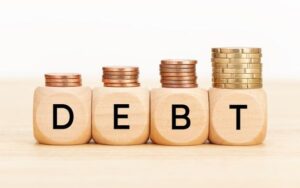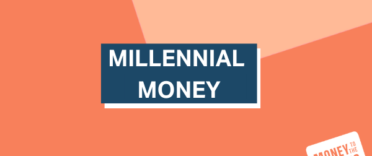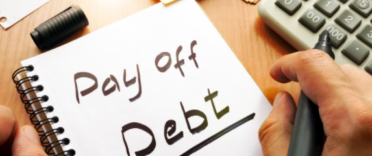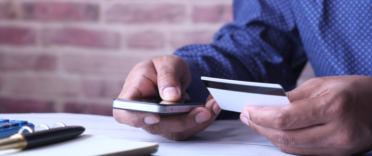
As the cost of living hits households across the UK, many people are struggling financially. One of the first troubles to hit households has been paying off debt becoming more difficult to manage. According to the Money Charity, the average unsecured debt for UK adults reached £4,287 in August 2024. Growing debt can be worrying and seem difficult to manage, but there are simple steps you can take to get back on track In this article, we look at what you can do if you are struggling to clear your debt and where you can go for debt help and advice.
How to clear debt - Credit cards
1. Budget
Budgeting is one of the most important things you can do to regain control of your finances as it allows you to see what you are spending your money on each month. When creating a budget you need to list every payment that you have going in and out of your account, which includes your income and all of your bills. To create a budget, you could use a budgeting app or our handy budgeting spreadsheet to get started.
Once you have listed all of your monthly income and outgoings you will have a clearer picture of where your money is going each month. It may also help to highlight areas of your budget where you are spending more than you would like, so that you can focus on cutting back, saving money and not adding to your debts through continued credit card use. Sorting your budget also helps to identify all of your credit card payments and how much you are paying toward clearing the balance of your credit cards each month.
2. Prioritise the debt
The next thing you should do is prioritise the debt you owe in order of the most expensive first. The most expensive debt will be the debt with the highest interest rate and the debt with the lowest interest rate will be a lower priority. Prioritising debt is important as paying high amounts of interest on your debt will take longer to clear and any payments you make are likely to be going towards the interest instead of repaying the debt owed.
An easy way to prioritise your debt is by:
- Making a list of the debts in order of highest interest first
- Work out your monthly budget for paying off the debt
- Set up minimum payment direct debits for the lowest priority cards
- Set up a direct debit to pay as much as you can (within budget) on the highest interest rate cards
Prioritising your debt in this way will help you to clear the highest interest rate card first. Once this debt is cleared you will be able to focus on the next highest rate card on the list and do the same. You may even be able to pay more than the minimum on some of the other cards, depending on how much you have left in your budget.
3. Use your savings
If you have any savings, you should consider using this money to clear your debt, especially if you are paying interest on your credit card balances. It is likely that you are earning much less interest on your savings than you are paying on your credit card debt. This means that using your savings to clear your credit card debt will help you to save money on interest in the long run. Even if it does not clear the full debt amount, it will still reduce the amount of money owed.
4. Pay more than the minimum
Paying more than the minimum repayment will help you to clear your debt more quickly. According to the Money Charity, the average household credit card debt in October 2023 was £2,409. Based on this and a 25% interest rate, it would take 26 years and 7 months to clear the debt when only making the minimum repayment each month. However, if instead of paying the minimum payment, you increased it to a set amount of £70 each month, it would only take 4 years and 8 months to repay the full amount. Read more about how minimum payments work in our article 'What is the minimum payment on a credit card?'.
5. Make a balance transfer
One way to immediately reduce the amount of interest payable on your credit card debt is by making a 0% balance transfer. Transferring your balance to a 0% balance transfer credit card means you will not pay any interest for the interest-free period and can instead use this time to focus on clearing as much of the debt as possible without it increasing with interest charges. When the introductory period ends you will have to start paying interest, so you may want to consider making another balance transfer at this point. We explain the details of a balance transfer in our article 'How to do a credit card balance transfer in 5 minutes'.
More information, including the best deals, can be found in our article, 'The best 0% interest balance transfer credit cards'.
6. Consolidate your debt
Credit card debt can be more difficult to manage if you have multiple cards and debt in different places. Consolidating the debt could help you to feel more in control as it is easier to manage one monthly repayment than many. The best option is likely to again be through a 0% balance transfer credit card. Our article, 'What is the best way to consolidate my debt?' shares more information on debt consolidation.
If your debt is overwhelming, you can get free debt advice from experts who can help you to manage your spending and restructure your borrowing.
How to clear debt - Loans
Personal loans have some benefits compared to credit cards but they can also be less flexible when it comes to clearing debt. We explain more about the differences between loans and credit cards in our article, 'Is it better to get a credit card or a personal loan?'
If you have a loan and you are struggling to manage the repayments or want to pay it off more quickly, here are some ways to clear what you owe faster. If your debt is overwhelming, you can get free debt advice from experts who can help you to manage your spending and restructure your borrowing.
1. Budget
Just like with clearing credit card debt, budgeting will help you to identify where all of your money goes each month and find the areas of your finances where you may have spare cash to go towards your loan repayments. We have a handy budgeting spreadsheet which can help you to get your finances in order, or you could download a budgeting app and learn to manage your money on the go from your smartphone.
2. Change the payment date
An easy way to ensure you don't miss a single loan payment is by changing the payment date, assuming your provider allows this. Changing the payment date to the day after you get paid means the money will leave your account at the earliest opportunity and cannot be accidentally spent before the loan repayment is due. If you then work out in your budget that you have spare money each month that you would like to pay towards your loan debt, you can also make this payment at the beginning of the month or after your payday. It is worth noting that some loan providers charge early repayment fees, so make sure you check before making additional loan repayments.
3. Switch to a cheaper deal
It may be possible to switch your loan to a better deal, paying a lower interest rate. Additionally, you may be able to reduce the loan's term length, which is another way to reduce the amount of interest you'll pay overall. If you are able to switch the loan to a shorter repayment term, you will reduce the amount of interest you pay while paying off the loan far more quickly. Be aware that the repayments will be higher each month in this scenario, so you need to ensure that it is affordable.
4. Use a money-transfer credit card
One way to clear your loan and hopefully pay less interest is via a money-transfer credit card. These credit cards usually come with introductory interest-free periods which allow you to pay off the debt without paying interest. A money-transfer credit card allows you to transfer a lump sum of cash to your bank account that can then be used to pay off the loan in full, assuming there are no early repayment charges. Alternatively, you could use this money to pay the repayments each month by setting up a regular payment to clear the debt on the credit card within the interest-free period. Once the interest-free period has ended, you will be liable to pay interest, so you may wish to consider moving any remaining balance to a 0% balance transfer credit card.
Be aware that most money transfer credit cards charge a fee for transferring the money, usually 2% to 5%, so this would only be worth considering if you are paying a high amount of interest on your existing loan. Find out more in our article, 'Can I use a 0% credit card to clear loan debt - and is it a good idea?'
5. Overpay
If you have identified that you have spare cash in your budget each month you should consider overpaying your loan to clear the debt quicker. Overpaying your debt can also make you more favourable to lenders in the future as they may take this into consideration should you need to take a payment holiday or reduce your repayments.
Before overpaying your loan, you should ensure that your lender does not have any restrictions or fees when overpaying. While most lenders are flexible and allow overpayment, some lenders charge a fee for paying off a loan early - often referred to as an early settlement - or they may restrict you to a set percentage of the loan amount.
How to clear debt - Overdrafts
Having access to an overdraft can be useful, especially if an unexpected payment comes out of your account. However, it can also be a hindrance, especially if you find yourself living in your overdraft each month. It can become a particular issue if the overdraft is cleared by your salary each month, only for your bills and monthly spending to see you pushed back into your overdraft again, with the cycle repeating each month. If you find yourself in this monthly cycle, follow the steps below to help clear your overdraft for good. If you find the debt is becoming too difficult to manage, you can find out more about free debt advice in our article 'Where to get free debt advice'.
1. Budget
As with all of the debt mentioned in this article, budgeting is one of the most effective ways to help you to clear your debt. This is because you can identify where all of your payments are going each month and highlight any non-essential spending. Our handy budget planner can help you get started if you are new to budgeting or alternatively, download a budgeting app and connect your bank accounts to see where your money is going each month. If you can identify any spare cash via your budget, this can allow you to incrementally pay off your overdraft, which will reduce how much you are paying in the long term.
2. Use savings
If you have any savings built up you should consider using your savings to clear your overdraft, particularly if you are being charged interest for being in your overdraft every month. If the interest rate on your debt is higher than what you would earn on your savings, it makes sense to clear your overdraft in full and use the money you were previously paying on interest to build your savings back up.
For tips on building your savings, read our article, 'Building an Emergency Fund – the what, why & how'.
3. Use a money-transfer credit card
Another way to clear your overdraft is with a money-transfer credit card. You can often find a money-transfer credit card with a 0% interest period, which gives you an amount of time to clear the debt while paying no interest. Money transfer credit cards often charge a money transfer fee, which can be 2% - 5%, so check to see how much interest is being charged on the overdraft to ensure it makes financial sense to take the money transfer option. More information on money-transfer credit cards can be found in our article, 'The best money-transfer credit cards'.
4. Switch to a low-interest overdraft
If you don't want to open a credit card or you don't have any savings to clear your debt, you could choose to switch bank account to a provider with no interest or low-interest charges on overdrafts. Alternatively, if you are unable to switch the overdraft to a new bank because of the size of your overdraft, you could still switch bank accounts and agree on an overdraft repayment plan with your existing bank account provider. Before switching accounts and overdrafts ensure you read the T&Cs of each provider carefully. Find out the best deals in our article, 'Best bank account switching offers'.
What to do if you’re struggling to clear debt
If you have debt that you are struggling to repay or you are finding the debt overwhelming, seek help as soon as possible. There are a number of websites and charities that offer free help and advice and it is important you seek help and don't avoid the problem.
Charities and websites that offer free help and advice include:
- Citizens Advice
- Moneyhelper (Formerly the Money Advice Service)
- National Debtline
- Payplan
- StepChange
- Turn2us
- The Money Charity
Find out more in our article 'Where to get free debt advice'.
If a link has an * beside it this means that it is an affiliated link. If you go via the link Money to the Masses may receive a small fee which helps keep Money to the Masses free to use. But as you can clearly see this has in no way influenced this independent and balanced review of the product.







